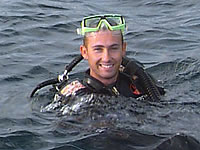Ocean to Estuarine Ecosystems (Advanced) - BIOS3681
Faculty: Faculty of Science
School: School of Biological, Earth & Environmental Sciences
Course Outline: http://www.bees.unsw.edu.au/
Campus: Sydney
Career: Undergraduate
Units of Credit: 6
EFTSL: 0.12500 (more info)
Indicative Contact Hours per Week: 6
Enrolment Requirements:
None
Excluded: BIOS3081
CSS Contribution Charge: 2 (more info)
Tuition Fee: See Tuition Fee Schedule
Further Information: See Class Timetable
View course information for previous years.
Description
Assumed knowledge: BIOS2031 and BEES2041
Note: Available to students in Advanced Science- Life Sciences and, subject to the availability of places, to students in BEnvironSci (Biology and Marine) and in 3970 (Biological Science, Ecology, and Biological Oceanography Majors with a credit average or better in BIOS courses). A compulsory field trip will be held during the mid-session break, and will involve personal expense to individual students.









